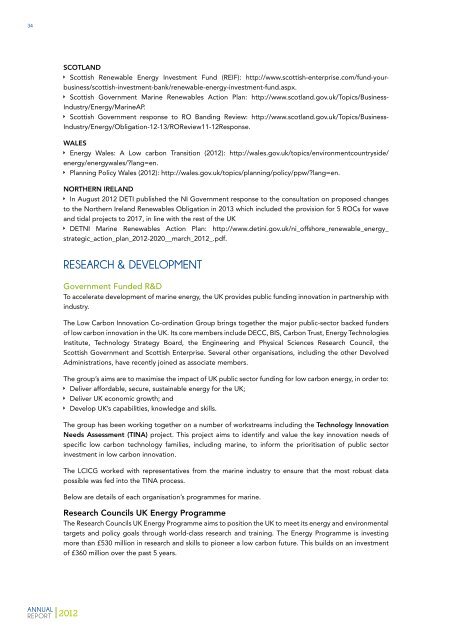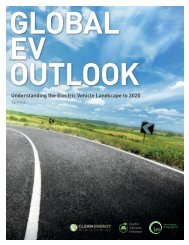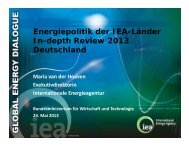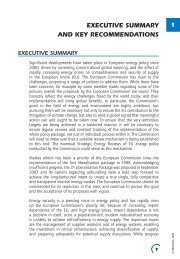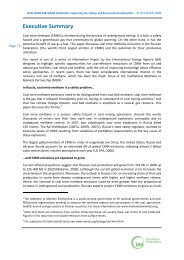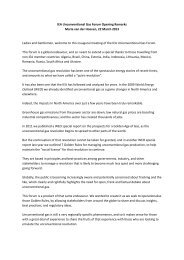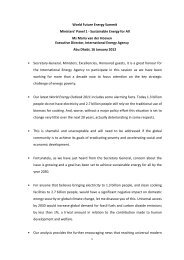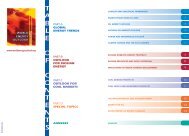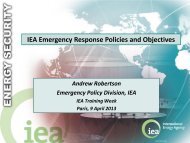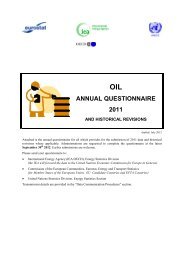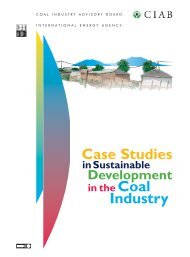OES Annual Report 2012 - Ocean Energy Systems
OES Annual Report 2012 - Ocean Energy Systems
OES Annual Report 2012 - Ocean Energy Systems
Create successful ePaper yourself
Turn your PDF publications into a flip-book with our unique Google optimized e-Paper software.
34<br />
SCOTLAND<br />
ÌÌ<br />
Scottish Renewable <strong>Energy</strong> Investment Fund (REIF): http://www.scottish-enterprise.com/fund-yourbusiness/scottish-investment-bank/renewable-energy-investment-fund.aspx.<br />
ÌÌ<br />
Scottish Government Marine Renewables Action Plan: http://www.scotland.gov.uk/Topics/Business-<br />
Industry/<strong>Energy</strong>/MarineAP.<br />
ÌÌ<br />
Scottish Government response to RO Banding Review: http://www.scotland.gov.uk/Topics/Business-<br />
Industry/<strong>Energy</strong>/Obligation-12-13/ROReview11-12Response.<br />
WALES<br />
ÌÌ<br />
<strong>Energy</strong> Wales: A Low carbon Transition (<strong>2012</strong>): http://wales.gov.uk/topics/environmentcountryside/<br />
energy/energywales/?lang=en.<br />
ÌÌ<br />
Planning Policy Wales (<strong>2012</strong>): http://wales.gov.uk/topics/planning/policy/ppw/?lang=en.<br />
NORTHERN IRELAND<br />
ÌÌ<br />
In August <strong>2012</strong> DETI published the NI Government response to the consultation on proposed changes<br />
to the Northern Ireland Renewables Obligation in 2013 which included the provision for 5 ROCs for wave<br />
and tidal projects to 2017, in line with the rest of the UK<br />
ÌÌ<br />
DETNI Marine Renewables Action Plan: http://www.detini.gov.uk/ni_offshore_renewable_energy_<br />
strategic_action_plan_<strong>2012</strong>-2020__march_<strong>2012</strong>_.pdf.<br />
RESEARCH & DEVELOPMENT<br />
Government Funded R&D<br />
To accelerate development of marine energy, the UK provides public funding innovation in partnership with<br />
industry.<br />
The Low Carbon Innovation Co-ordination Group brings together the major public-sector backed funders<br />
of low carbon innovation in the UK. Its core members include DECC, BIS, Carbon Trust, <strong>Energy</strong> Technologies<br />
Institute, Technology Strategy Board, the Engineering and Physical Sciences Research Council, the<br />
Scottish Government and Scottish Enterprise. Several other organisations, including the other Devolved<br />
Administrations, have recently joined as associate members.<br />
The group’s aims are to maximise the impact of UK public sector funding for low carbon energy, in order to:<br />
ÌÌ<br />
Deliver affordable, secure, sustainable energy for the UK;<br />
ÌÌ<br />
Deliver UK economic growth; and<br />
ÌÌ<br />
Develop UK’s capabilities, knowledge and skills.<br />
The group has been working together on a number of workstreams including the Technology Innovation<br />
Needs Assessment (TINA) project. This project aims to identify and value the key innovation needs of<br />
specific low carbon technology families, including marine, to inform the prioritisation of public sector<br />
investment in low carbon innovation.<br />
The LCICG worked with representatives from the marine industry to ensure that the most robust data<br />
possible was fed into the TINA process.<br />
Below are details of each organisation’s programmes for marine.<br />
Research Councils UK <strong>Energy</strong> Programme<br />
The Research Councils UK <strong>Energy</strong> Programme aims to position the UK to meet its energy and environmental<br />
targets and policy goals through world-class research and training. The <strong>Energy</strong> Programme is investing<br />
more than £530 million in research and skills to pioneer a low carbon future. This builds on an investment<br />
of £360 million over the past 5 years.<br />
ANNUAL<br />
REPORT <strong>2012</strong>


